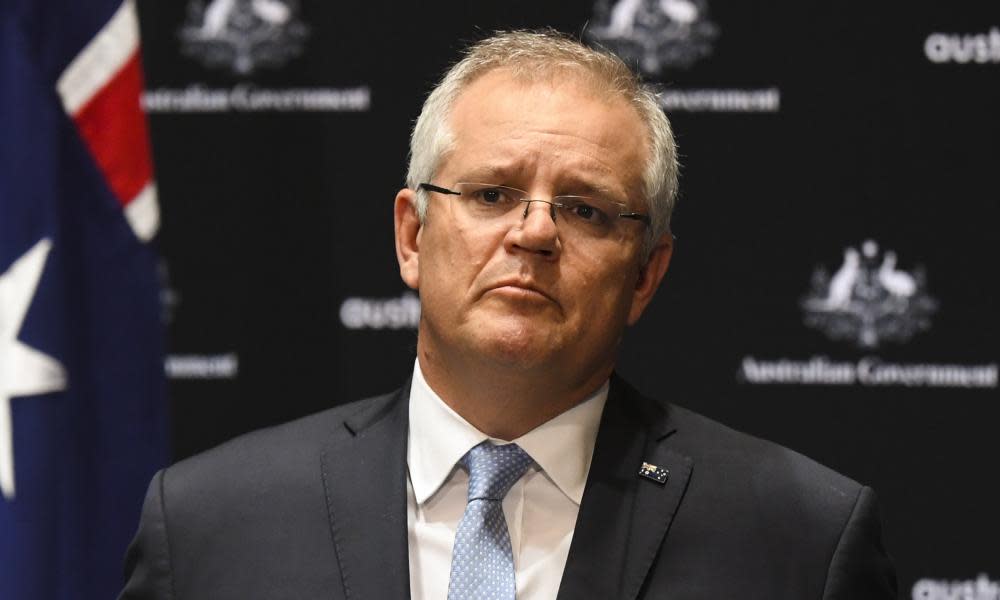Australia's reliance on Five Eyes for Covid-19 economic strategy excludes top trade partners

The Morrison government’s push for economic talks among finance ministers from countries in the Five Eyes intelligence-sharing alliance remains vague, with no details yet about the frequency of meetings or their agenda.
But some experts have argued the move to coordinate economic policies with Australia’s traditional security partners reflects a “very deep misunderstanding” of our modern economic interests given the group excludes Asia and most of Europe.
The government indicated this week that Australia had secured support from the other countries in the Five Eyes pact – the United Kingdom, United States, Canada and New Zealand – to hold “regular” meetings to coordinate economic responses during the Covid-19 pandemic.
The existing intelligence-sharing arrangement has its origins in the 1940s – and during the Cold War was focused on the Soviet Union – but over time the cooperation between partners has broadened beyond signals intelligence to include issues such as terrorism, organised crime, law-enforcement and borders.
Related: Scott Morrison's call for Australia to renovate won't rebuild a broken economy | Van Badham
While security analysts have voiced support for expanding the group’s focus at a time when China has become increasingly assertive on the world stage, other observers are sceptical.
“Whether it’s a thought bubble or not, the idea reflects a very deep misunderstanding of Australia’s national interests in the world economy which are concentrated heavily in Asia,” Peter Drysdale, emeritus professor of economics at the Australian National University, told Guardian Australia.
“Two-thirds of our external commerce is with non-Five Eyes countries, minus New Zealand. It’s this region where our economic prosperity and political security lies and strategies that effectively engage this region in the multilateral system that protects them both are the top priority.”
Drysdale, who is head of the East Asian Bureau of Economic Research at the ANU’s Crawford School of Public Policy and whose previous work help paved the way for the establishment of Apec, said he was not arguing against engaging with the Five Eyes.
“But as a major theatre for economic coordination that matters to our future, the international market forces that are important now to us clearly point elsewhere,” he said.
“Australia’s prosperity and security is best secured through the regional Asean+6, East Asian Summit and Apec arrangements and through the G20 globally, even if the United States continues to play spoiler in that global system.”
Labor’s foreign affairs spokesperson, Penny Wong, also expressed doubts about the substance of the proposal, saying she would expect discussions with Five Eyes partners to be “standard practice”.
“What we haven’t seen is a serious plan to engage with our region – particularly southeast Asia – and in the G20 to rally the world’s largest economies to coordinate a global response to this crisis,” she told Guardian Australia.
The treasurer, Josh Frydenberg, said this week it was sensible that in a challenge such as the Covid pandemic allies should “coordinate and that we again talk to each other on a regular basis about the economic sphere”.
He characterised the proposal as being about “coordinating with trusted partners of Australia” amid “new complexities in the geopolitical environment”.
Geoff Miller, a former Australian ambassador to Japan and high commissioner to New Zealand, said the Five Eyes membership evoked the “Anglosphere”.
From Australia’s vantage point, it was “a very strange grouping within which to hold important economic discussions” given the exclusion of significant trading partners including China, Japan, India, South Korea, Taiwan and Singapore, Miller wrote in an article for the Pearls and Irritations public policy blog.
Related: Morrison says support measures are only temporary 'medication' for sick economy
But Peter Jennings, head of the Australian Strategic Policy Institute, said it was substantial and welcome for the Five Eyes to discuss economic cooperation and the crossover of economics and security.
“I can imagine them talking about 5G and IT for example,” he said.
“It is significant that Australia is pushing this in the absence of US leadership.”
Patrick Walsh, a former intelligence analyst and now the associate professor of intelligence and security studies at Charles Sturt University, said he saw the proposal as a necessary push towards stronger strategic coordination after Covid-19.
“Covid-19 really exposed for Australians, but also other Five Eyes partners, the vulnerability of critical supply chains in medical equipment and supplies,” he said.
Walsh said he did not think the intent was to stop trade with China. “It’s more about asking how we can have better risk management around industries that are currently critical or likely to be critical to national security in the future.”
He said Xi Jinping’s government had taken an increasingly “aggressive” and “muscular” approach to its relations with western countries – including imposing trade restrictions against Australia after its call for a Covid-19 inquiry.
Asked on Friday about the health of the comprehensive strategic partnership with China, Morrison insisted Australia had “done nothing to injure that partnership” and would act in its national interest.

 Yahoo News
Yahoo News 
